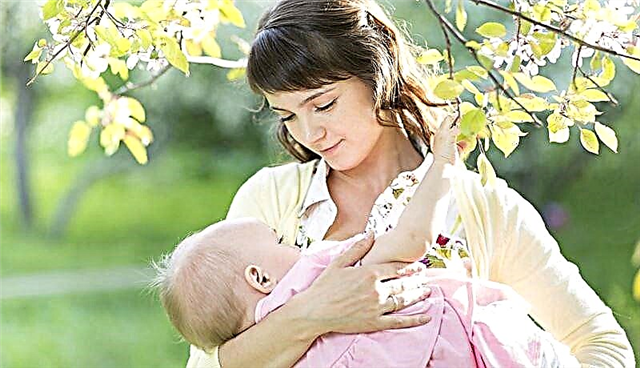Every mother looks forward to the baby's first word. Most often this word is "mom". However, you should not rush the baby, since speech skills in children develop at different rates. It depends on heredity, on the sex of the child and on how often parents, grandparents, older brothers and sisters communicate with him.

The first words are the most important
The time of consciously speaking words
All parents want to know when a child says "mom". The time of conscious pronunciation of words for each child varies and is determined by the following factors:
- Gender (boys usually start talking later than girls);
- Heredity;
- The presence or absence of anomalies in the development of the palate and tongue (for example, the development of speech may slow down with a shortened bridle);
- Features of the bite;
- Individual temperament of the child.
The physical well-being of the baby also plays an important role. Often sick children begin to speak later than their peers.
The approximate age of the first words
The question of what time children say "mom" is difficult to answer unequivocally. A healthy baby already at 9-10 months tries to name objects that are in his field of vision. Such speech cannot yet be called deliberate. The crumb simply imitates adults, copying the sounds they pronounce. After a year, the baby begins to understand how to use speech; it is to this time that the first conscious words belong. For example, a toddler can call dad, mom or "baba" to him, using a specific word in relation to a specific person. When a child starts to say "mom", "dad" and other words consciously, you can already talk to him almost like an adult.

Field of the year, the child's vocabulary increases significantly
First word variations
Statistics say that the first word in the vocabulary of 70% of children under one year old is “mother”. However, this is not necessary at all. Other options are also possible: "nanny", "baba" or even "kisya" (if the baby is shown a cat every day and repeat her name). The first can be any word, except for those that contain consonant sounds difficult for articulation: "sh", "sch", "c", "r". A young lover of toy cars can say "BBC" for the first time, a girl, seeing a beautiful doll, can say "Lala". If the mother is often away, the baby can be the first to name the name of the adult with whom he most of all communicates: these are grandmothers, aunts, brother or sister ("Anya", "Lyolya", "Julia"). Therefore, do not wait for the child to say "mom". Perhaps he will be the first to utter a completely different word.

In "childish" language, the baby tries to name everything that interests him
Interesting. The baby's articulation apparatus develops gradually. At first he pronounces only sounds (the so-called "humming"), then consonants "m", "n", "l" are added to them, as the most convenient for pronunciation. Perhaps that is why the word "mother" sounds similar in all languages of the world - the sounds "m" and "a" are easiest for a baby to pronounce.
Stimulating your baby to speak lucidly
When babies start speaking their first words, it becomes a joyous experience for parents. A completely healthy child can be silent for a long time, “like a partisan,” if his parents do not encourage him to pronounce deliberate words. It is known that the brain zones responsible for the development of speech are actively developed during any action with the hands: finger games, drawing, modeling. To hear the first words faster, parents should:
- Play more often with the child in the constructor, cubes, pyramids to develop coordination of movements and fine motor skills;
- Name the baby objects that he sees every day (cat, dog, spoon, car);
- Sing children's songs to the kid and tell age-appropriate fairy tales ("Kolobok", "Hen-Ryaba");
- View children's picture books with a baby and compose short stories from pictures.
It is necessary to pronounce all the words in a conversation with the baby clearly, correctly placing the stress and pronouncing all the letters. If the rate of speech is too fast, the child is unlikely to understand something, so the conversation between the adult and the crumbs should be calm, measured. It is not recommended for the kid to play modern children's songs that sound at a fast pace (for example, the Kukutiki ensemble), such music is for children from 3 years old and older.

Games for the development of fine motor skills contribute to the development of lucid speech.
Help for the little "silent"
It happens that parents are actively involved with the baby: they sculpt, paint, sing songs and read fairy tales, but the boy (girl) is still silent. To gently and unobtrusively help the baby in mastering speech, you must:
- Visit an orthodontist and dentist (perhaps the delay in speech is caused by problems with the teeth or bite);
- Start weaning from the nipple (prolonged sucking on the pacifier can significantly slow down the development of speech);
- More often ask the child what exactly he wants so that the baby does not show with gestures, but calls objects with words;
- Tell the kid about everything that he sees at home, on a trip, on a walk.
It is known that children of silent parents, as a rule, also do not differ in talkativeness, this is normal. Heredity plays an important role in mastering speech skills. The most important thing is to deal with the baby every day, then the vocabulary of the crumbs will begin to grow very quickly.
Under no circumstances should you put pressure on a 12-16 month old baby, forcing him to pronounce a specific word (for example, "mom"). At this age, children pronounce only what they are able to pronounce, the vocal apparatus of each develops individually. For some it is easier to say "mom", for others - "dad" or "woman". Sooner or later, when the time comes, the baby will master all the sounds of the Russian language without exception.

If a healthy baby is silent for a long time, this is not a reason for worry.
Signs of delayed speech development
If, after one and a half years, a boy or girl continues to be silent, a pediatrician or neuropathologist may diagnose "delayed speech development." It should be borne in mind that such a diagnosis is most often made against the background of other concomitant disorders and diseases. If the baby is practically healthy, you can not worry and just wait a little. The alarm should be sounded if:
- The kid not only does not speak, but also does not understand the speech of adults;
- The infant does not respond to words addressed to him;
- The child does not show interest in the world around him, does not like to look at children's picture books;
- In the medical history of the little silent man, there are congenital neurological pathologies.
Experts say that the intensive development of speech is facilitated by the child's attendance at a kindergarten (nursery school) and developmental group activities appropriate for age, as well as active communication with older brothers and sisters (if there are other children in the family). If the baby spends a lot of time alone and is often left to himself, he may not say the first words for a very long time.
Parents should monitor not only the quantity but also the quality of the first words. Children after a year can already be delicately corrected, stimulating them to speak correctly (for example, not "bibika", but "machine"). In order for the development of speech skills to go right, speech therapists categorically do not recommend teaching children under three years of age a foreign language, even in the form of a game.
The exception is bilingual families, where parents initially speak different languages, in this case a healthy baby can easily learn both, but this happens gradually.
Attention! If a healthy baby actively communicates with others in his own language, no one understands, this is a variant of the norm. The child is already talking, just for now, in his own way. If a kid one and a half years and older is constantly silent, wary of others, often shows aggressiveness and refuses to communicate, this may be a sign of autism.
If the baby is already one year old, but he is in no hurry to please the elders with the first words, you should not panic. A healthy, well-developed physically baby will definitely speak; the main thing is to stimulate him to this by personal example. If the infant has any neurological impairment or is frequently ill, the delay in speech development may be caused by a serious disorder that requires specialist supervision.



